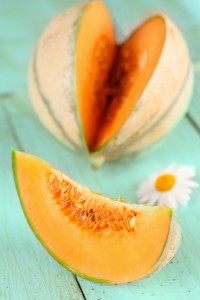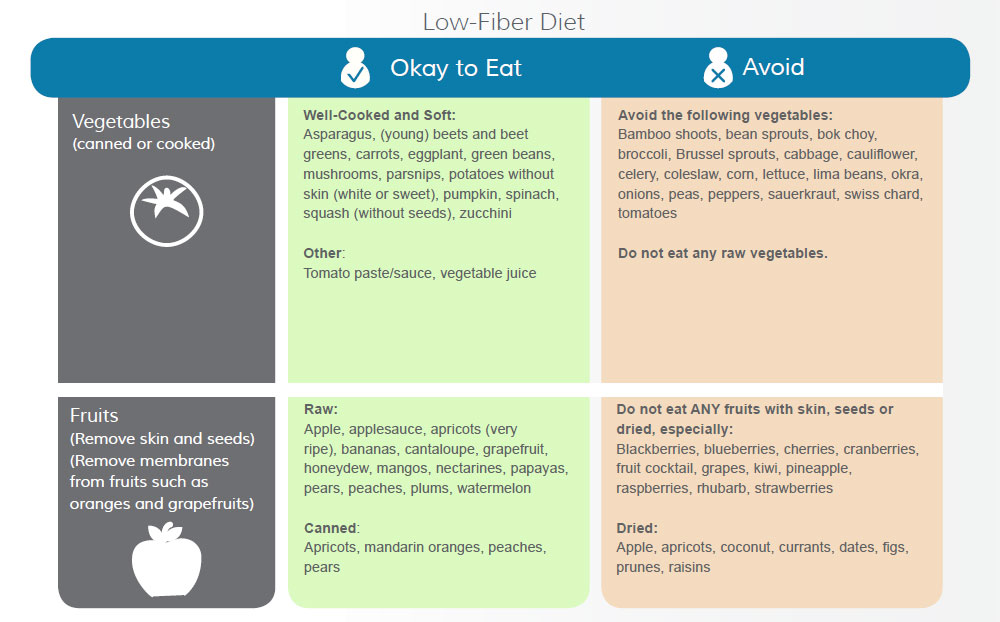
Fiber is found in plant foods, such as vegetables, fruits, beans, nuts, legumes, and seeds. It is considered an indigestible carbohydrate. Sometimes when your bowel becomes obstructed or if the risk of bowel obstruction is present, your doctor or dietician may advise you to follow a Low-Fiber Diet. In doing so, you lessen stool bulk and limit the amount of undigested materials that pass through your small and large intestines.
As you begin a Low-Fiber Diet, remember to eat several small meals a day instead of three large meals. Drink plenty of fluids – water, permitted fruit and vegetable juices, herbal teas – to avoid constipation.
Given the somewhat limited choices of foods in this diet, try to eat as many different types of low-fiber foods as you can, so that your body gets sufficient nutrients. You may need to take a multivitamin supplement if you are not getting the necessary nutrients from this diet.
Avoid any foods that make your symptoms worse – even if they are part of the Low-Fiber Diet. Individual tolerances for various foods vary, so listen to what your body tells you and stay away from foods that don’t agree with you.
Quick Tips:
- Avoid any foods that make your symptoms worse.
- Cook vegetables to reduce the amount of gas they produce when you eat them.
- As your symptoms improve, bring a greater variety of foods back into your diet one at a time and in small amounts. This will help you to identify any foods that you cannot tolerate.
Here is a page from the free Digestive Health Guide that shows the foods you should and should not eat while following a Low-Fiber Diet:

Stay tuned next week for an overview of the minimal fiber diet.
As with any diet, please consult your doctor and/or dietician prior to starting a new diet or if you notice changes in your bowel movements. Generally, we do not recommend staying on a Low-Fiber Diet for an extended period of time. Check with your doctor about the duration of your diet.
Related Content:
Research and Success Rates
- Study Results for a Non-Surgical Bowel Obstruction Treatment
- Study Results for a Non-Surgical Bowel Obstruction Treatment
- Bowel Obstruction Success Rates
Questions Answered
- Recurring Small Bowel Obstruction Treatment Frequently Asked Questions
- The Most Common Causes of Bowel Obstruction and How to Prevent It
- Bowel Blockage Symptoms
- How to Prevent Bowel Obstruction
- Can Diverticulitis Cause Bowel Obstruction?
- Seven Signs of Intestinal Blockage
- What to know before accepting an IBS Diagnosis
- How Long Does a Bowel Obstruction Last?
- What is the Cause of a Small Bowel Obstruction and What Are Your Options for Treatment?
- How Will My Lifestyle Change with Small Bowel Obstructions?
- Is There a Natural Treatment for Small Bowel Obstruction?
- What SBO Patients Can Expect From Treatment
Treatment
- At a Glance: Bowel Obstruction
- Bowel Obstruction
- Bowel Obstruction – Need Help Now?
- Bowel Obstruction Treatment
- [Infographic] The Main Causes of Bowel Obstructions
Patient’s Stories
- Bowel Obstruction: Patient Story Update
- Video Testimonial – A Mother’s Journey to Recovery: Small Bowel Obstruction
- What Is Bowel Obstruction? – A Patient’s Perspective
- A Glimpse into a Brave Young Boy’s Journey with CHARGE Syndrome
- Success Story: Clear Passage Allowed Me to Resume My Adventures
- Emergency Small Bowel Obstruction Surgery in India
- An End to Bowel Obstructions
Diet
- How to Relieve a Bowel Obstruction: Diet Guide
- Recipes For Bowel Obstruction Patients
- Diet Guide for Avoiding Bowel Obstruction
- Diet Modifications to Help You Handle a Small Bowel Obstruction
- Digestive Health Guide
- Bowel Obstruction: Diet & Lifestyle Recommendations
- Minimal Fiber Diet for Digestive Disorders
- Nutritional Guidelines
- Transitioning to a Regular Diet from a Low or Minimal Fiber Diet
- Low Fiber Diet for Digestive Disorders
Bowel Obstruction | SBO | SIBO



